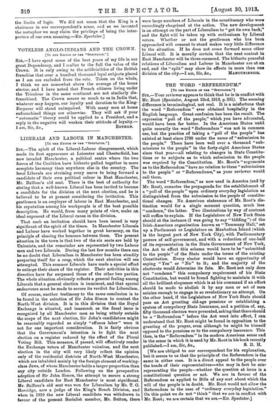LIBERALS AND LABOUR IN MANCHESTER. [To THE EDITOR Or THE
" SPECTATOR.")
Sin,—The spirit of the Liberal-Labour disagreement, which made its first appearance at Leicester and Chesterfield, has now invaded Manchester, a political centre where the two forces of the Coalition have hitherto pulled together in more complete harmony than anywhere else in the country. The local Liberals are straining every nerve to bring forward a candidate of their own political colour in East Manchester, Mr. Balfour's old seat. There is the best of authority for stating that a well-known Liberal has been invited to become a candidate for the division at the next election, and he is believed to be at present considering the invitation. This gentleman is an employer of labour in East Manchester, and his reputation among his workpeople is of the best possible description. He would, from many points of view, make an ideal exponent of the Liberal cause in the division.
That such an invitation should have been issued is very significant of the spirit of the times. In Manchester Liberals and Labour have worked together in great harmony, on the principle of sharing the honours between them. The present situation in the town is that two of the six seats are held by Unionists, and the remainder are represented by two Labour men and two Liberals. During the last few months there can be no doubt that Liberalism in Manchester has been steadily preparing itself for a coup, which the next election will see attempted. This summer Liberals have made a special effort to enlarge their share of the register. Their activities in this direction have far surpassed those of the other two parties. The whole situation obviously reflects a general feeling among Liberals that a general election is imminent, and that special endeavours must be made to secure its verdict for Liberalism.
Of course, another testimony to the same conclusion is to be found in the selection of Sir John Simon to contest the North-West division. It is in this division that the Royal Exchange is situated, and inasmuch as the fiscal issue is recognized by all Manchester men as being utterly outside the scope of the next election, Sir John's candidature might be reasonably regarded as simply "effusus labor" were it not for one important consideration. It is fairly obvious that the Government's intention is to fight the next election on a register reduced by the effect of the Plural Voting Bill. This measure, if passed, will effectively render the Exchange voters of Manchester voiceless, and the next election in the city will very likely reflect the opinion only of the residential districts of North-West Manchester, which are inhabited mainly by the foreign element of working- class Jews, of whom Manchester holds a larger proportion than any city outside London. Following on the prospective adoption of Sir John Simon, the attempt to secure a strong Liberal candidate for East Manchester is most significant. Mr. Balfour's old seat was won for Liberalism by Mr. T. G. Horridge, now a judge of the King's Bench Division, and when in 1910 the new Liberal candidate was withdrawn in favour of the present Socialist member, Mr. Sutton, there were large numbers of Liberals in the constituency who were exceedingly chagrined at the action. The new development is an attempt on the part of Liberalism to " get its own back," and the fight will be taken up with enthusiasm by Liberal voters. Whether or not the gentleman who has been approached will consent to stand makes very little difference to the situation. If be does not come forward some other Liberal will. It is morally certain that the next contest in East Manchester will be three-cornered. The hitherto peaceful relations of Liberalism and Labour in Manchester are at an end, and the " split" may show its effects in more than one division of the city.—I am, Sir, &c., MANCIINIENSIS.


































 Previous page
Previous page